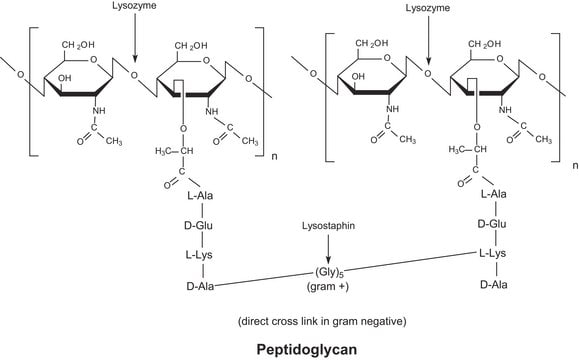A1075
Amyloid β Protein Fragment 1-40
≥90% (HPLC), powder
Sinônimo(s):
Aβ40
Faça loginpara ver os preços organizacionais e de contrato
About This Item
Fórmula empírica (Notação de Hill):
C194H295N53O58S
Número CAS:
Peso molecular:
4329.80
Número MDL:
Código UNSPSC:
12352202
NACRES:
NA.32
Produtos recomendados
Nível de qualidade
Ensaio
≥90% (HPLC)
Formulário
powder
cor
white
solubilidade
1% acetic acid: 1 mg/mL
saline: insoluble
nº de adesão UniProt
temperatura de armazenamento
−20°C
Informações sobre genes
human ... APP(351)
Procurando produtos similares? Visita Guia de comparação de produtos
Amino Acid Sequence
Asp-Ala-Glu-Phe-Arg-His-Asp-Ser-Gly-Tyr-Glu-Val-His-His-Gln-Lys-Leu-Val-Phe-Phe-Ala-Glu-Asp-Val-Gly-Ser-Asn-Lys-Gly-Ala-Ile-Ile-Gly-Leu-Met-Val-Gly-Gly-Val-Val
Descrição geral
Amyloid β Protein Fragment 1-40 (Aβ40) is derived from the amyloid-β protein (Aβ), which is mapped to human chromosome 21q21.3. Aβ40 is predominantly present in the vascular amyloid deposits. Aβ40 comprises of C-terminal membrane insertion domain. It shows structural transition from random coil to a α-helical structure in a water-micelle medium.
Aplicação
Amyloid β Protein Fragment 1-40 has been used:
- in the temperature based conformational studies using Fourier transform infrared/differential scanning calorimetry (FT-IR/DSC) studies
- as a reference standard in sandwich-type enzyme immunoassay for quantifying amyloid A4 protein in cerebrospinal fluid of patients with head trauma
- as a component of embryonic stem cell medium to inhibit amyloid deposition in fibroblasts
Ações bioquímicas/fisiológicas
Amyloid β Protein Fragment 1-40 (Aβ40) forms cation based ion channels.
Amyloid β-protein is neurotrophic and neurotoxic in vivo and in vitro in human and rat neuronal cell cultures. β-Amyloid peptides (amino acids 1-42 and 1-43) are the major constituents of senile plaques and neurofibrillary tangles that occur in the hippocampus, neocortex, and amygdala of patients with Alzheimer′s disease.
Reconstituição
For maximal biological activity, dilute the stock in calcium-free PBS to 1 mg/ml and incubate at 37 °C for 4 days.
Outras notas
Lyophilized from 0.1% TFA in H2O
Código de classe de armazenamento
11 - Combustible Solids
Classe de risco de água (WGK)
WGK 3
Ponto de fulgor (°F)
Not applicable
Ponto de fulgor (°C)
Not applicable
Equipamento de proteção individual
Eyeshields, Gloves, type N95 (US)
Escolha uma das versões mais recentes:
Já possui este produto?
Encontre a documentação dos produtos que você adquiriu recentemente na biblioteca de documentos.
Os clientes também visualizaram
Solution Structure of Amyloid beta-Peptide (1- 40) in a Water- Micelle Environment. Is the Membrane-Spanning Domain Where We Think It Is?
Coles M, et al.
Biochemistry, 37(31), 11064-11077 (1998)
D R Howlett et al.
Neurodegeneration : a journal for neurodegenerative disorders, neuroprotection, and neuroregeneration, 4(1), 23-32 (1995-03-01)
The behaviour of synthetic batches of beta-amyloid (beta A) 1-40 peptide in solution has been studied. The effects of beta A1-40 on a PC12 cell toxicity assay was dependent upon the time of preincubation of an aqueous solution of the
H Funato et al.
The American journal of pathology, 152(4), 983-992 (1998-04-18)
Amyloid beta-protein (Abeta) is the major component of senile plaques that emerge in the cortex during aging and appear most abundantly in Alzheimer's disease. In the course of our immunocytochemical study on a large number of autopsy cases, we noticed
M Citron et al.
Proceedings of the National Academy of Sciences of the United States of America, 93(23), 13170-13175 (1996-11-12)
Cerebral deposition of the amyloid beta protein (A beta) is an early and invariant feature of Alzheimer disease (AD). Whereas the 40-amino acid form of A beta (A beta 40) accounts for approximately 90% of all A beta normally released
Diversity of amyloid beta protein fragment [1-40]-formed channels
Kourie JI, et al.
Cellular and Molecular Neurobiology, 21(3), 255-284 (2001)
Artigos
Alzheimer's disease (AD) is the most common cause of dementia in the elderly and is characterized by gradual loss of cognitive functions.
Nossa equipe de cientistas tem experiência em todas as áreas de pesquisa, incluindo Life Sciences, ciência de materiais, síntese química, cromatografia, química analítica e muitas outras.
Entre em contato com a assistência técnica
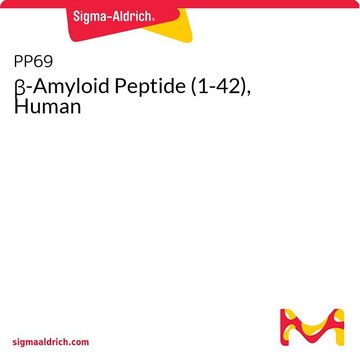

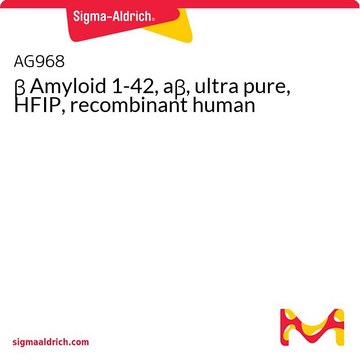

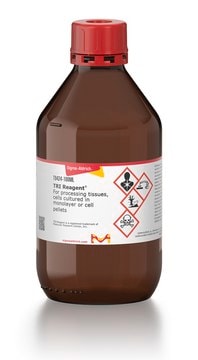
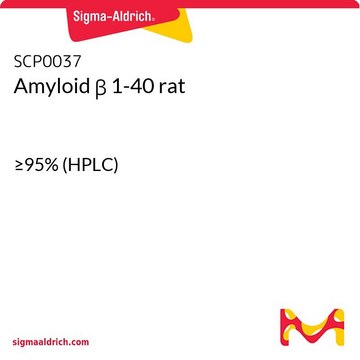
![[Gln22]-Amyloid β 1-40 human ≥95% (HPLC)](/deepweb/assets/sigmaaldrich/product/images/707/874/59f84b84-17c2-494f-b2ae-4ca860b83976/640/59f84b84-17c2-494f-b2ae-4ca860b83976.jpg)
